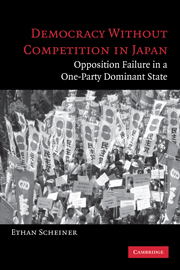Book contents
- Frontmatter
- Contents
- Tables and Figures
- Glossary of Abbreviations
- Acknowledgments and a Note on the Use of the Online Appendix
- Introduction: The Puzzle of Party Competition Failure in Japan
- 1 The Importance of Party Competition and a Model of Party Competition Failure
- 2 Opposition Failure in Japan: Background and Explanations
- 3 Clientelism and Its Determinants
- 4 The Impact of Clientelism and Centralized Government Financial Structure: Comparative Analysis
- 5 Local Opposition Failure in Japan
- 6 National-Level Opposition Failure: The Impact of Subnational-Level Weakness
- 7 Political Economy Changes and Their Impact on Party Systems: Comparative Analysis
- 8 Parallel Party Systems: Political Economy Changes and the Limits to Anti-Clientelist Appeals in Japan
- 9 The Problem of Organization and Coherence in Top-Down Party Formation
- 10 Conclusion: Democracy Without Competition
- References
- Index
4 - The Impact of Clientelism and Centralized Government Financial Structure: Comparative Analysis
Published online by Cambridge University Press: 02 December 2009
- Frontmatter
- Contents
- Tables and Figures
- Glossary of Abbreviations
- Acknowledgments and a Note on the Use of the Online Appendix
- Introduction: The Puzzle of Party Competition Failure in Japan
- 1 The Importance of Party Competition and a Model of Party Competition Failure
- 2 Opposition Failure in Japan: Background and Explanations
- 3 Clientelism and Its Determinants
- 4 The Impact of Clientelism and Centralized Government Financial Structure: Comparative Analysis
- 5 Local Opposition Failure in Japan
- 6 National-Level Opposition Failure: The Impact of Subnational-Level Weakness
- 7 Political Economy Changes and Their Impact on Party Systems: Comparative Analysis
- 8 Parallel Party Systems: Political Economy Changes and the Limits to Anti-Clientelist Appeals in Japan
- 9 The Problem of Organization and Coherence in Top-Down Party Formation
- 10 Conclusion: Democracy Without Competition
- References
- Index
Summary
A defining feature of Japanese politics is the combination of clientelism and a centralized financial structure. Where a political system is clientelist and centralized – where local politicians must rely on the financial graces of the central government to do their job – parties that are not strong at the national level will have difficulty winning subnational office, and national ruling parties will hold a near monopoly on local power across most of the country. To investigate the combined impact of clientelism and centralization, this chapter examines different combinations of citizen–politician linkage and financial centralization in a number of countries outside Japan.
The combination of clientelism and local dependence on the center creates very strong incentives for (1) ambitious local politicians – who rely on the image of being able to pull in money and projects from the center – to ally with the party controlling the purse strings at the national level (the ruling party) and (2) voters to cast ballots in local elections for such candidates. Here I am pointing to “ambition” in Schlesinger's (1966) sense of politicians who want a long and productive career in politics. I am not suggesting that politicians who affiliate with non-ruling parties are somehow unambitious, and I am certainly not ignoring the fact that many candidates will choose non-ruling parties for other reasons, such as ideology.
- Type
- Chapter
- Information
- Democracy without Competition in JapanOpposition Failure in a One-Party Dominant State, pp. 90 - 107Publisher: Cambridge University PressPrint publication year: 2005



